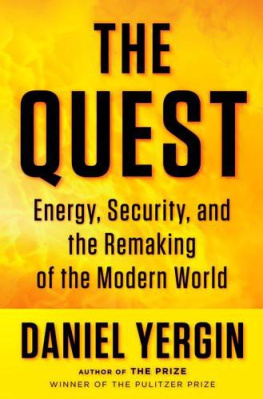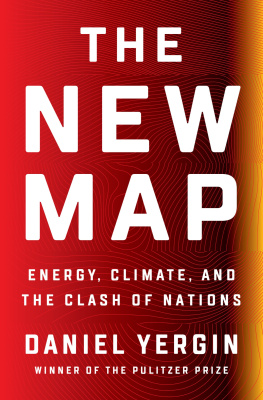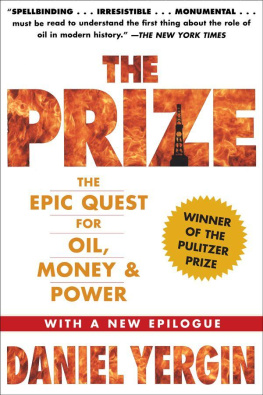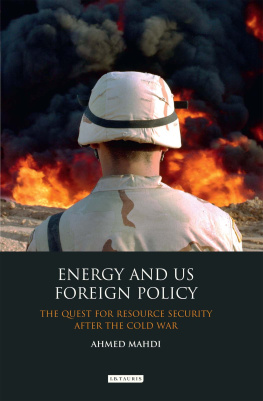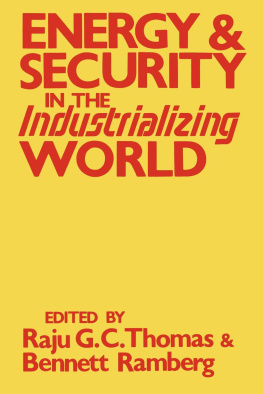Table of Contents
ALSO BY DANIEL YERGIN
The Prize
Shattered Peace
Coauthored by Daniel Yergin
The Commanding Heights
Russia 2010
Global Insecurity
Energy Future
THE PENGUIN PRESS
Published by the Penguin Group
Penguin Group (USA) Inc., 375 Hudson Street, New York, New York 10014, U.S.A. Penguin Group (Canada), 90 Eglinton Avenue East, Suite 700, Toronto, Ontario, Canada M4P 2Y3 (a division of Pearson Penguin Canada Inc.) Penguin Books Ltd, 80 Strand, London WC2R 0RL, England Penguin Ireland, 25 St. Stephens Green, Dublin 2, Ireland (a division of Penguin Books Ltd) Penguin Books Australia Ltd, 250 Camberwell Road, Camberwell, Victoria 3124, Australia (a division of Pearson Australia Group Pty Ltd) Penguin Books India Pvt Ltd, 11 Community Centre, Panchsheel Park, New Delhi110 017, India Penguin Group (NZ), 67 Apollo Drive, Rosedale, Auckland 0632, New Zealand (a division of Pearson New Zealand Ltd) Penguin Books (South Africa) (Pty) Ltd, 24 Sturdee Avenue, Rosebank, Johannesburg 2196, South Africa
Penguin Books Ltd, Registered Offices:
80 Strand, London WC2R 0RL, England
First published in 2011 by The Penguin Press,
a member of Penguin Group (USA) Inc.
Copyright Daniel Yergin, 2011
All rights reserved
Photograph credits appear on pages 72223.
LIBRARY OF CONGRESS CATALOGING IN PUBLICATION DATA
Yergin, Daniel.
The quest :energy, security, and the remaking of the modern world / by Daniel Yergin. p. cm.
Includes bibliographical references and index.
ISBN : 978-1-101-56370-0
1. Power resourcesPolitical aspects. 2. MoneyPolitical aspects 3. Globalization. I. Title.
HD9502.A2Y47 2011
333.79dc22
2011013100
MAPS BY VIRGINIA MASON
GRAPHICS BY SEAN MCNAUGHTON
MOBI TO EPUB CONVERSION BY SAYURJENGKOL
DE-DRM-ED MOBI BY GUDANGAMAZON
Without limiting the rights under copyright reserved above, no part of this publication may be reproduced, stored in or introduced into a retrieval system, or transmitted, in any form or by any means (electronic, mechanical, photocopying, recording or otherwise), without the prior written permission of both the copyright owner and the above publisher of this book.
The scanning, uploading, and distribution of this book via the Internet or via any other means without the permission of the publisher is illegal and punishable by law. Please purchase only authorized electronic editions and do not participate in or encourage electronic piracy of copyrightable materials. Your support of the authors rights is appreciated.
While the author has made every effort to provide accurate telephone numbers and Internet addresses at the time of publication, neither the publisher nor the author assumes any responsibility for errors, or for changes that occur after publication. Further, publisher does not have any control over and does not assume any responsibility for author or third-party Web sites or their content.
http://us.penguingroup.com
INTRODUCTION
T hey happened at the same time, halfway around the globe from each other. They both shook the world.
On March 11, 2011, at 2:46 in the afternoon Japan time, 17 miles below the seabed, the pressure between two vast tectonic plates created a massive violent upward force that set off one of the most powerful earthquakes ever recorded. In addition to widespread damage to buildings and infrastructure in the region north of Tokyo, the quake also knocked out the power supply, including that to the Fukushima Daiichi nuclear complex. Fifty-five minutes later, a huge tsunami unleashed by the quake swept over the coast, drowning thousands and thousands of people. At the Fukushima Daiichi complex, located at the very edge of the ocean, the massive tsunami surged above the seawall and flooded the power station, including its backup diesel generator, depriving the hot nuclear reactors of the cooling water required to keep them under control. In the days that followed, explosions damaged the plants, radiation was released, and severe meltdowns of nuclear rods occurred.
The result was the worst nuclear accident since the explosion at the Chernobyl nuclear plant in Soviet Ukraine a quarter century earlier. The Fukushima accident, compounded by damage to other electric generating plants in the area, led to power shortages, forcing rolling blackouts that demonstrated the vulnerability of modern society to a sudden shortage of energy supply. The effects were not limited to one country. The loss of industrial production in Japan disrupted global supply chains, halting automobile and electronics production in North America and Europe, and hitting the global economy. The accident at Fukushima threw a great question mark over the global nuclear renaissance, which many had thought essential to help meet the power needs of a growing world economy.
On the other side of the world, a very different kind of crisis was unfolding. It had been triggered a few months earlier not by the clash of tectonic plates, but by a young fruit seller in the Tunisian town of Sidi Bouzid. Frustrated by constant harassment by the towns police and by the indifference of local officials, he doused himself with paint thinner and set himself aflame in protest in front of the city hall. His story and the ensuing demonstrations, transmitted by mobile phones, Internet, and satellite, whipped across Tunisia, the rest of North Africa, and the Middle East. In the face of swelling protests, the regime in Tunisia collapsed. And then, as protesters filled Tahrir Square in Cairo, so did the government in Egypt. Demonstrations against authoritarian governments spread across the entire region. In Libya, the protests turned into a civil war which drew in NATO.
The global oil price shot up in response not only to the loss of petroleum exports from Libya, but also to the disruption of the geostrategic balance that had underpinned the Middle East for decades. Anxiety mounted as to what the unrest might mean for the Persian Gulf, which supplies 40 percent of the oil sold into world markets, and for its customers around the globe.
These two very different but concurrent sets of events, oceans away from each other, delivered shocks to global markets. The renewed uncertainty and insecurity about energy, and the anticipation of deeper crisis, underscored a fundamental realityhow important energy is to the world.
This book tries to explain that importance. It is the story of the quest for the energy on which we so completely rely, for the position and rewards that accrue from energy, and for the security it affords. It is about how the modern energy world developed, about how concerns about climate and carbon are changing it, and about how different the energy world may be tomorrow.
Three fundamental questions shape this narrative: Will enough energy be available to meet the needs of a growing world and at what cost and with what technologies? How can the security of the energy system on which the world depends be protected? What will be the impact of environmental concerns, including climate change, on the future of energyand how will energy development affect the environment?
As to the first, the fear of running out of energy has troubled people for a long time. One of the nineteenth centurys greatest scientists, William Thomsonbetter known as Lord Kelvinwarned in 1881, in his presidential address to the British Association for the Advancement of Science in Edinburgh, that Britains energy base was precarious and that disaster was impending. His fear was not about oil, but about coal, which had generated the Age of Steam, fueled Britains industrial preeminance, and made the words of Rule, Britannia! a reality in world power. Kelvin somberly warned that Britains days of greatness might be numbered because the subterranean coal-stores of the world were becoming exhausted surely, and not slowly and the day was drawing close when so little of it is left. The only hope he could offer was that windmills or wind-motors in some form will again be in the ascendant.



